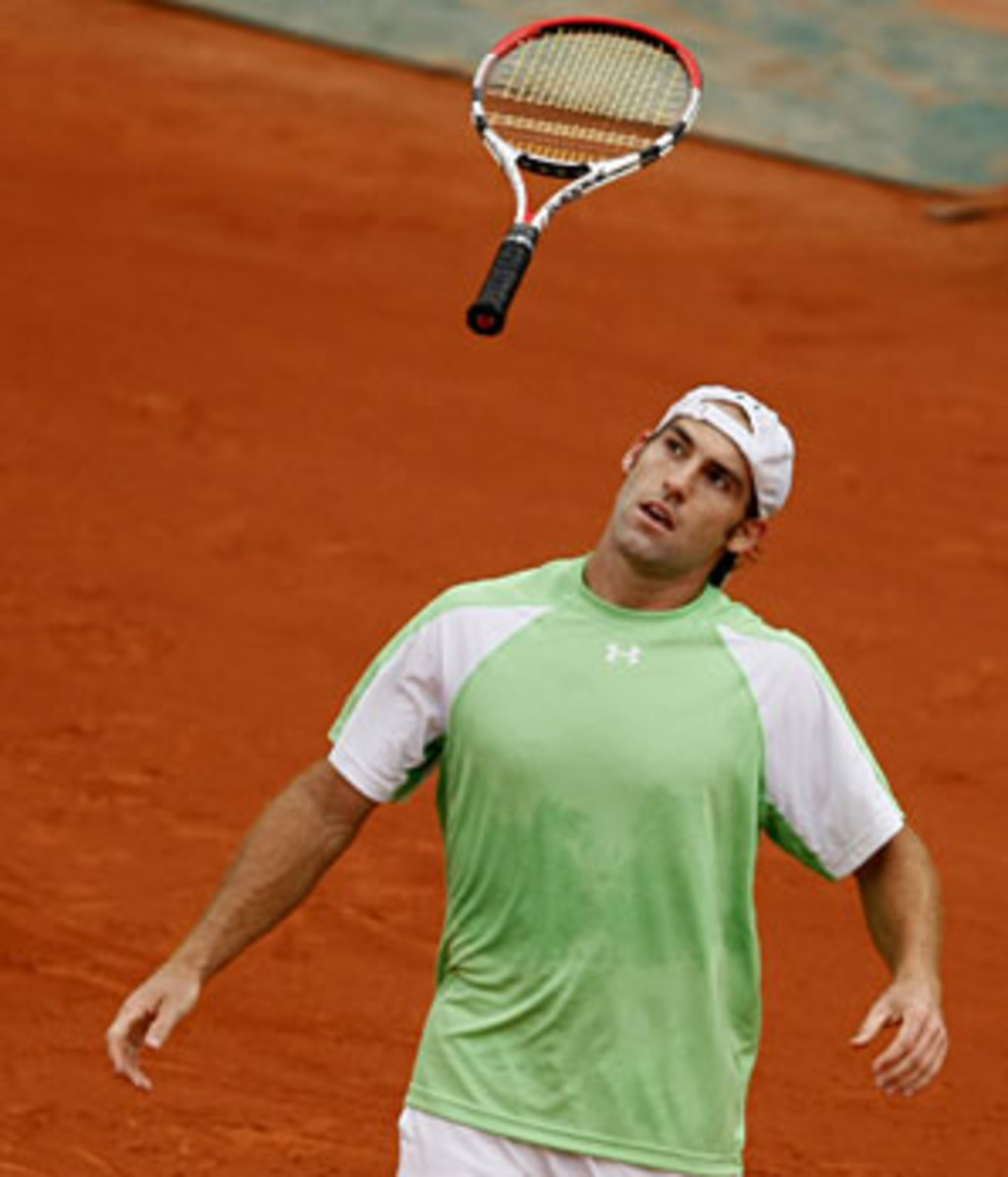The Last American Man walks off into sunset after Djokovic defeat
PARIS -- The Last American Man fell Monday. It was early in the third set on Court Phillippe Chatrier and Robby Ginepri had stumbled after a lob on the Parisian grit, landed flat on his face. Now, without looking up, he figured the only way to burn off his humiliation was with a show of strength. Ginepri planked his body. Once, twice, three times he pumped his arms, completing some very fine push-ups. "It was funny," said his opponent, Novak Djokovic. "He showed that he's very strong."
But it was sad, too, because it was also the end. The most stunning fourth-round matchup of the 2010 French Open had been all even before that, the 98th-ranked Ginepri having rolled Djokovic to win his first-ever set off the No. 3 seed. But now it was 0-1, 15-30 and the ploy backfired; Ginepri's serve got broken, he won just more three games, lost 6-4, 2-6, 6-1, 6-2. "Probably never do push-ups again on court," he said.
Any other day, of course, it wouldn't matter much. But events had conspired; every other U.S. male had already crashed out: A suddenly passive Andy Roddick, a suddenly clueless Sam Querrey and a suddenly powerless John Isner, even the top-ranked doubles team of Bob and Mike Bryan. Now it was Memorial Day and NBC would be showcasing tennis all morning; websites and newspapers had trumpeted Ginepri's new role. For a few hours, he would be more than the guy who upset former French champ Juan Carlos Ferrero in the third round. He was the all-caps archtype, a reminder of clay-court despair and the future's narrow prospects, symbol of the disappearing Yankee Doodle Dandy: The Last American Man.
"I'll do what I can," he said beforehand, "to represent the U.S. as well as I can."
It was a tall task. In tennis terms, no U.S. man has won at Roland Garros since Andre Agassi triumphed at Roland Garros in 1999, and no Grand Slam event more dramatically showcases the ever-declining prospects. Then again, it hasn't been the best of times for the breed overall; the American Man has been on a losing streak for at least as long. Since the turn of the century, it's been all political incompetence, steroid abuse or virulent Lewinskyism, a non-stop parade featuring Eliot Spitzer, Mark Sanford, John Edwards and, of course, one very talented golfer. The workplace? Women will soon outnumber men. Racial progress? The women's vote put Barack Obama in the White House. It's no wonder that every beer ad and sitcom features befuddled boobs. In tennis and out, it's been one long slide down.
But here, now, was Ginepri. Soft-spoken and a weathered 27, the Kennesaw, Ga., native has a certain cowboy reserve, and enough mileage on him these days to embody rugged individualism. A neck injury had limited his range of motion the last two years, laid him out immobile on a couch in London for three days last summer, ravaged his serve. Ginepri finally underwent a procedure earlier this spring to, as he put it, "burn the nerves" and, with just one tour-level win all year, rode into town with no coach or trainer to hold his hand. "It's nice being out on the court," he said, "and not have someone always telling you what they think you should do."
Despite F. Scott Fitzgerald's endlessly recycled dictum about there being "no second acts in American lives", the comeback has become the ultimate national narrative, and Ginepri embodies that, too. His career up to now can be summed up as flurries of interest followed by periods of total vacancy, but when his former coach, Jose Higueras, spoke to him after he had beaten Querrey in the first round, he sensed that Ginepri is "beginning to appreciate what he does, and knows that it's not going to last forever.
"He's got to be willing to go out there and make it a physical match," Higueras said before Monday's match. "We all know Novak can blink where there's a battle, so Robby's got to look for his openings and before that he's going to have to do some work, be willing to suffer. That's the nature of clay."
That very nature, though, is what has brought so many American tennis dreams to grief. The surface demands patience and brains, touch as well as brawny ballstriking; it's no mistake that Roddick's sledgehammer game has always left European sensibilities cold.
For a time, Ginepri embraced that nature Monday, working points, working Djokovic around in the second set until he was literally gasping. But any French philosopher would nod at the final result: Ginepri tried to get macho -- got American -- in the third set. Ginepri did a few push-ups, got mesmerized by his own firepower, and soon found Djokovic picking him apart.
With Ginepri down 1-5 in the third set, no one at Chatrier had any doubt of the result. "Robby, come back!" a man yelled, but it sounded like the little boy's vain plea in Shane. Soon the cowboy would be packing his bags and waving, walking off into the sunset. The Last American Man, gone.






